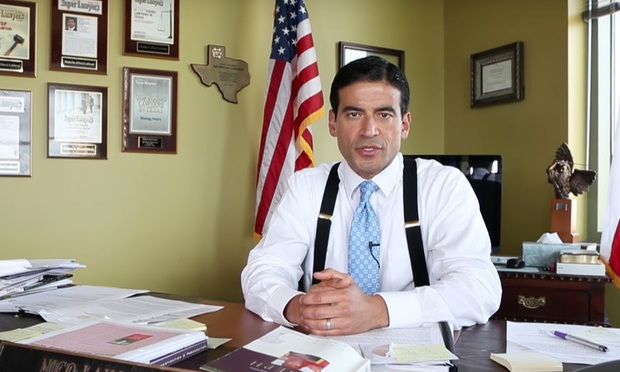Former DA Disqualified From Representing Criminal Defendant
"The integrity of our judicial system is put at risk, when a district attorney participates, albeit briefly, as counsel for the state in a case in which he later, after leaving office, acts as counsel adverse to the state," the Fourth Court of Appeals ruled.
August 28, 2019 at 03:58 PM
4 minute read
 Nico LaHood, a partner in LaHood Norton Law Group in San Antonio. Credit: YouTube.
Nico LaHood, a partner in LaHood Norton Law Group in San Antonio. Credit: YouTube.
Former Bexar County Criminal District Attorney Nico LaHood and his law firm should be disqualified from representing a criminal defendant whose case started while LaHood was still San Antonio's top prosecutor, an appellate court has ruled.
"This ruling affirms our belief that the integrity of the justice system is paramount and must be protected. This decision has state-wide implications, as the issue of prosecutor disqualifications has been left unclear for several years. It is our hope this ruling will serve as a guiding light to the other courts," said a statement by the current district attorney, Joe Gonzales.
LaHood lost reelection in 2018 to Gonzales. In January, LaHood went back to practicing criminal-defense law with San Antonio lawyer Jay Norton in their new firm, LaHood Norton Law Group.
Another lawyer there, Jason Goss, entered an appearance for criminal defendant Michael Stovall just seven days after LaHood left office. Goss, LaHood and Norton have all signed a motion in the case, said the opinion by Fourth Court of Appeals Justice Rebeca Martinez, joined by Justices Beth Watkins and Liza Rodriguez.
In June, the district attorney's office moved to disqualify the law firm, because back when he was district attorney, LaHood "was privy to the state's entire case against Stovall." At a disqualification hearing, an assistant district attorney testified that in December 2018, LaHood called her to his office and looked at photos of the complainant's injuries, reviewed 911 calls, and discussed the strengths and weaknesses of the Stovall case.
The prosecutor assigned to Stovall's case testified that Goss asked her to dismiss the case, implying that he had information about something that would "kill the case."
The trial court denied disqualification of LaHood Norton Law Group, finding that even if LaHood shared his knowledge of the case with Norton and Goss, the state hadn't met its burden to show that LaHood was privy to work product or confidential information and there wasn't evidence that he actively prosecuted Stovall.
The state sought mandamus relief.
The appeals court wrote that the trial court got it wrong, because Texas law "unequivocally and clearly requires the disqualification of a district attorney, who, after leaving office, is counsel 'adverse to the state in any case in which the former district attorney was of counsel for the state.'"
The dispute in this case is whether LaHood was "counsel for the state" in the Stovall case. There are cases that interpret "counsel for the state" in the context of district attorneys who leave office to become trial judges, and must recuse themselves from cases they handled as prosecutors, the opinion said. For example, if a prosecutor investigated, advised or participated in a case, which rises to the level of active participation, then disqualification is merited.
The court found that when LaHood talked about Stovall's case with the assistant district attorney, reviewed the case and commented on his thoughts and opinions, he was participating in the preparation or investigation of the case. Texas law mandates his disqualification, the opinion said. Because his firm is so small, the entire firm must be disqualified.
"The integrity of our judicial system is put at risk, when a district attorney participates, albeit briefly, as counsel for the state in a case in which he later, after leaving office, acts as counsel adverse to the state," the opinion said. That interest outweighs the defendant's right to counsel of his choice.
LaHood and Goss didn't return a call seeking comment before deadline.
Read the opinion:
This content has been archived. It is available through our partners, LexisNexis® and Bloomberg Law.
To view this content, please continue to their sites.
Not a Lexis Subscriber?
Subscribe Now
Not a Bloomberg Law Subscriber?
Subscribe Now
NOT FOR REPRINT
© 2025 ALM Global, LLC, All Rights Reserved. Request academic re-use from www.copyright.com. All other uses, submit a request to [email protected]. For more information visit Asset & Logo Licensing.
You Might Like
View All
Are Counsel Ranks Getting 'Squeezed' as Nonequity and Associate Pay Grows?
5 minute read
Vinson & Elkins Expands Environmental Team with Chair of Texas Commission on Environmental Quality
4 minute read
Nondisparagement Clauses in Divorce: Balancing Family Harmony and Free Speech
6 minute read
Houston Trial Lawyer Mary-Olga Lovett Leaves King & Spalding to Open Boutique
3 minute readTrending Stories
Who Got The Work
J. Brugh Lower of Gibbons has entered an appearance for industrial equipment supplier Devco Corporation in a pending trademark infringement lawsuit. The suit, accusing the defendant of selling knock-off Graco products, was filed Dec. 18 in New Jersey District Court by Rivkin Radler on behalf of Graco Inc. and Graco Minnesota. The case, assigned to U.S. District Judge Zahid N. Quraishi, is 3:24-cv-11294, Graco Inc. et al v. Devco Corporation.
Who Got The Work
Rebecca Maller-Stein and Kent A. Yalowitz of Arnold & Porter Kaye Scholer have entered their appearances for Hanaco Venture Capital and its executives, Lior Prosor and David Frankel, in a pending securities lawsuit. The action, filed on Dec. 24 in New York Southern District Court by Zell, Aron & Co. on behalf of Goldeneye Advisors, accuses the defendants of negligently and fraudulently managing the plaintiff's $1 million investment. The case, assigned to U.S. District Judge Vernon S. Broderick, is 1:24-cv-09918, Goldeneye Advisors, LLC v. Hanaco Venture Capital, Ltd. et al.
Who Got The Work
Attorneys from A&O Shearman has stepped in as defense counsel for Toronto-Dominion Bank and other defendants in a pending securities class action. The suit, filed Dec. 11 in New York Southern District Court by Bleichmar Fonti & Auld, accuses the defendants of concealing the bank's 'pervasive' deficiencies in regards to its compliance with the Bank Secrecy Act and the quality of its anti-money laundering controls. The case, assigned to U.S. District Judge Arun Subramanian, is 1:24-cv-09445, Gonzalez v. The Toronto-Dominion Bank et al.
Who Got The Work
Crown Castle International, a Pennsylvania company providing shared communications infrastructure, has turned to Luke D. Wolf of Gordon Rees Scully Mansukhani to fend off a pending breach-of-contract lawsuit. The court action, filed Nov. 25 in Michigan Eastern District Court by Hooper Hathaway PC on behalf of The Town Residences LLC, accuses Crown Castle of failing to transfer approximately $30,000 in utility payments from T-Mobile in breach of a roof-top lease and assignment agreement. The case, assigned to U.S. District Judge Susan K. Declercq, is 2:24-cv-13131, The Town Residences LLC v. T-Mobile US, Inc. et al.
Who Got The Work
Wilfred P. Coronato and Daniel M. Schwartz of McCarter & English have stepped in as defense counsel to Electrolux Home Products Inc. in a pending product liability lawsuit. The court action, filed Nov. 26 in New York Eastern District Court by Poulos Lopiccolo PC and Nagel Rice LLP on behalf of David Stern, alleges that the defendant's refrigerators’ drawers and shelving repeatedly break and fall apart within months after purchase. The case, assigned to U.S. District Judge Joan M. Azrack, is 2:24-cv-08204, Stern v. Electrolux Home Products, Inc.
Featured Firms
Law Offices of Gary Martin Hays & Associates, P.C.
(470) 294-1674
Law Offices of Mark E. Salomone
(857) 444-6468
Smith & Hassler
(713) 739-1250






